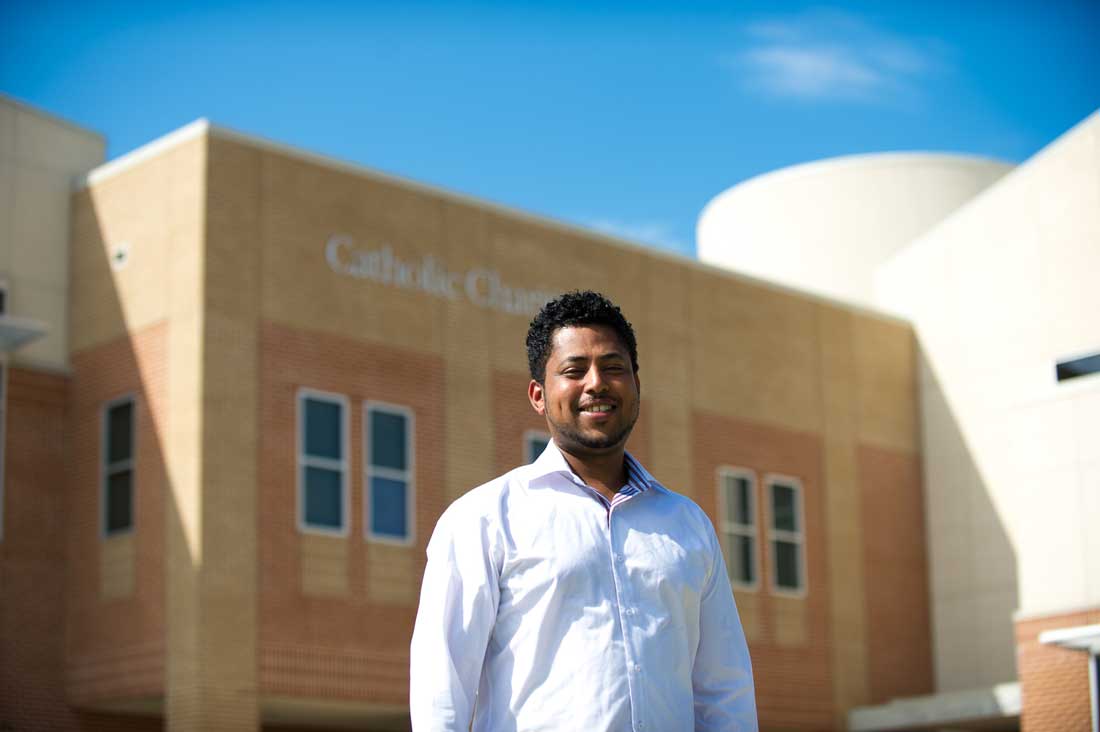Two years after a harrowing escape from Afghanistan and the Taliban, Frank finally has some semblance of normalcy in his adopted home of North Texas. He was recently reunited with his Afghan wife and young daughter.
Frank’s unexpected journey to the United States began shortly after the U.S. military overthrew the Taliban in 2003, when he took on a job translating documents for the U.S. Army. He had previously been an English teacher. His most frequent assignment was translating papers from the Afghanistan National Army.
Frank — an assumed name to protect his relatives still in Afghanistan — is in his early 30s, soft-spoken and amiable. As he recalled his journey, he frequently paused, giving careful thought to each story.
Shortly after the invasion, insurgents began targeting Afghans who collaborated with the U.S. military or other Westerners. While no official numbers have been released by the U.S. government, the number of interpreters killed in Afghanistan is estimated in the hundreds. Frank said each day he went to work not knowing if he would return alive.
“In that community, it’s really hard for people who work for the foreigners,” he recalled. “We were hiding what our job was. Even our neighbors didn’t know where I was working.”
When people asked about his job, Frank told them he was an English teacher. Getting to work was a daily ordeal. He never wore his work clothes in public, left for work at different times, and made sure not to use the same taxi regularly because he never knew who was “good or bad.”
The turning point came when his colleagues circulated pictures of interpreters who had been beheaded or shot by the Taliban. When he told his American supervisors that he needed to leave the country with his wife and daughter, they helped him prepare the documents to file with American immigration officials. He learned that he qualified for help through the International Organization for Migration, an intergovernmental entity that provides services and advice to migrants.
IOM “arranged everything, including departure from Afghanistan,” he recalled.
Leaving his parents was a difficult decision.
“In Afghanistan it is our culture to stick together,” he said. “We all live together — mom, dad, brothers, sisters — even when we get married. I miss my family, really, and they miss me too. Afghans always think when we are young and still small, Mom and Dad take care of us. When Mom and Dad get old, they need support and help. This is the way of life. Now it is my turn to help them, not leave them behind.”
His parents put his safety above family tradition, though, and encouraged him to leave Afghanistan as soon as possible. The U.S. State Department oversees resettlement of refugees such as Frank, assigning them to one of several nonprofit organizations.
In Fort Worth, those groups include Refugee Services of Texas, World Relief Fort Worth, Lutheran Immigration and Refugee Services, and Catholic Charities of Fort Worth. When Frank landed at the Dallas/Fort Worth International Airport, Catholic Charities staffers greeted him.
It took more than a year for Frank’s wife and daughter to get the necessary papers to join him — a year in which they were in danger every day.
Frank said his wife could sense that her neighbors suspected her family of collaborating with the Americans. The Afghan tradition of women remaining mostly indoors probably kept her safe, Frank said. On the day that she fled with her daughter, Frank talked to her about how to go unnoticed. She concealed her identity behind the long veiled gown called a burqa. Five months after their arrival here, his wife and daughter are beginning to learn English, he said.
In Frank’s eyes, he owes his life and the safety of his wife and daughter to Catholic Charities and their International Refugee Resettlement Program. From its headquarters in south Fort Worth, the charity operates 40 programs for disadvantaged groups throughout Tarrant County.
His caseworker, Bemnet Melaku, himself a former refugee from Ethiopia, gave Frank the same reminder that he gives all his clients.
“[Because of] the ones we left behind and those who died, we now have a second chance to live life again,” Melaku said. “We owe it to them. We cannot afford to be lazy or to waste time.”
Melaku said Frank not only excelled in the refugee program but taught him a lesson in humility and perseverance.
“We have different kinds of clients,” Melaku said. “Some are more appreciative than others, but we serve them all. And then we have clients like [Frank] — they actually teach us. You see the way they act, their discipline. It’s a lesson for us.”
Melaku’s first job was to help Frank get settled in an apartment. Frank’s first roommate, another refugee, was behaving aggressively toward him. Then as now, Frank was reluctant to ask for help, but Melaku soon heard of the situation and moved Frank to his own apartment for six months.
Frank came to the U.S. with a wide range of skills, including accounting, and before long he was working three jobs at once. Melaku explained how to construct a resumé and went with him to fill out job applications. Frank was first hired by a cell phone company but kept looking and eventually found an opening at American Airlines.
After an hour-long interview, the airline hired him as a bag scanner. “After three, four months they promoted me to be a ticket counter agent,” he said. “I really like it. I work with international people every day. I had experience working with international people back home.”
“He got his driver’s license by himself,” Melaku recalled. “It sounds simple, but it’s not simple for them because they are brand-new. It’s a new system, a whole different world, so we usually take clients everywhere. But he was doing it by himself.”
Frank closely follows events in Afghanistan. He knows his homeland is still far too dangerous for him to visit, meaning phone calls are now the only link between him and his parents. Just a week ago, a suspected insurgent shot and killed a U.S. two-star general and wounded 15 others in Kabul.
In three years, he will be eligible for U.S. citizenship. He hopes that becoming a citizen will make it possible to bring his parents to North Texas.
Melaku said refugees have good reason to worry about family members left behind.
“Back in my home country of Ethiopia, for example, if your dad was persecuted, and they wanted to kill your dad, and you are his son, they will kill you too,” he said. “So the danger is the same for family members, but the process can take forever. It requires determination and patience to keep going to the immigration office.”
Melaku said he keeps in touch with Frank, who has now completed the refugee resettlement program.
“I still see him coming to interpret” as a volunteer at Catholic Charities, Melaku said. “He enjoys helping Afghanis … with English.”
For Frank, the experience of the past several years has taught him about the importance of refugee programs like the one in Fort Worth.
“When I came here, I found that Catholic Charities really helped me,” Frank said. “I had nothing, but right now I have everything — a job, house, by the help of Catholic Charities. I can only thank them.
“They give hope to people like me.”
Fort Worth freelance writer Edward Brown can be reached at ejb0017@yahoo.com.












